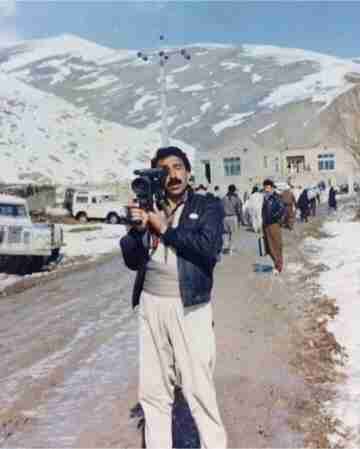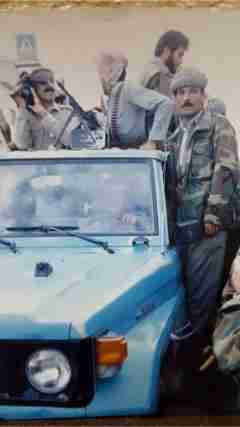A story of a Peshmerga and Cameraman
The Peshmerga, meaning "those who face death" in Kurdish, are Kurdish fighters or soldiers dedicated to defending the Kurdistan Region and advancing Kurdish rights as protectors of the Kurds. they fought against oppressive Iraqi regime, notably Saddam Hussein, during the mid-20th century.

The Peshmerga became an official military force of the
Kurdistan Regional Government in 2005. according to the Kurdistan Regional
Government's Ministry of Peshmerga there are approximately 200,000 Peshmerga
forces.
And gained international recognition for their role in combating ISIS, the Peshmerga fought alongside various international allies, including the United States-led coalition, which provided air support, training, and equipment. They also collaborated with Iraqi federal forces and various Kurdish and non-Kurdish militias to combat ISIS effectively.
I was born on September 10, 1955, and I joined the Peshmerga in 1983 from the Shekh Zorab Organization, which was part of the PDK Peshmerga. Back then, cameras were a significant change for us. During the revolution, most people used their own cameras rather than professional ones. In 1985, I received a basic handheld camera from the political bureau. It had a battery life of only 20 minutes, and with the limited electricity in the countryside, charging it was a constant challenge. Before this, I had no experience with cameras. Growing up in the city, I was familiar with cinema and television, but I had never filmed anything myself. A friend encouraged me to start filming the war, despite my lack of experience.

Most of the Peshmergas, nearly 80% of us, were around my age
and had never seen war before. We were forced to fight due to the oppression
and bombings by warplanes on our villages, children, and families. As I said,
"When you go to war, you learn something new." At first, the sound of
gunfire frightened us, but over time, we became accustomed to it. We had older
Peshmergas with us who weren't afraid at all, which helped us overcome our
fears, even when under fire.
Our area was mostly PDK Peshmerga. In 1987, when the Kurdistan Front (Wujud) was formed, the PUK came to our area. Prior to that, we
had been allied with the Iraqi Communist Party. We conducted many operations
together, but the PDK was stronger in our region. In the midst of war, personal
relationships with family members faded; anyone who fought alongside you became
like a brother. We didn’t consider personal benefit; our shared goal was what
mattered most.
Mala Mustafa Barzani, may he rest in peace, once said, "We have no friends but the mountains”. This was a reflection of our isolation; Iran, Iraq, and the Arab were all against us but as governments not as people. The mountain symbolized the revolution and resistance. It was where we went to fight and resist. Even today, I believe the revolution continues. The Kurds have faced challenges, and we still have a long way to go, till we achieve independence. The Gulan revolution was a military breakthrough, but the enemy was stronger due to their resources the fact that they were an oil rich country. Three countries worked against the Kurdish cause, and internal conflicts among Kurds also had a significant impact.

I moved to the ‘Merdin’ camp later on, where I got married.
We faced a severe shortage of weapons. Despite our bravery, without proper
arms, our lives were constantly at risk. However, having a camera involved in
the operations was encouraging. The thought that our struggles might be
preserved on film, even if we didn’t know if anyone would ever see it,
motivated us. Dr. Rozh, who supported us with cameras, played a significant
role. He was highly educated and experienced, and his support was invaluable.
I believe even during the ISIS war, every Peshmerga station
had to have a camera. The role of war cameramen is sacred because their work
preserves the history of the conflict. Documentaries hold more value than films
with actors because they capture real events. Looking back at our
documentaries, I realize that without them, we wouldn’t have recognized each
other, we’ve changed and grown older. No amount of money can replicate the
value of these documentaries.
Disagreements and opposition are natural, but it's crucial to prevent repeating the past for future generations. Protecting our achievements is vital, and unity is key to a nation’s success. While opposition is expected, we will not accept the enemy taking away our rights. In the past, Arabic names were common among us because our fathers and grandfathers believed they were holier due to religion. However, after the birth of my first child, we switched to Kurdish names. My firstborn is named Armanj, meaning "goal," reflecting our aspirations. My second son, Omed, means "hope," and my third, Aza, means "freedom," symbolizing our newfound freedom at the time. We stopped using Arabic names; instead, we embraced Kurdish names, which we find more meaningful.



